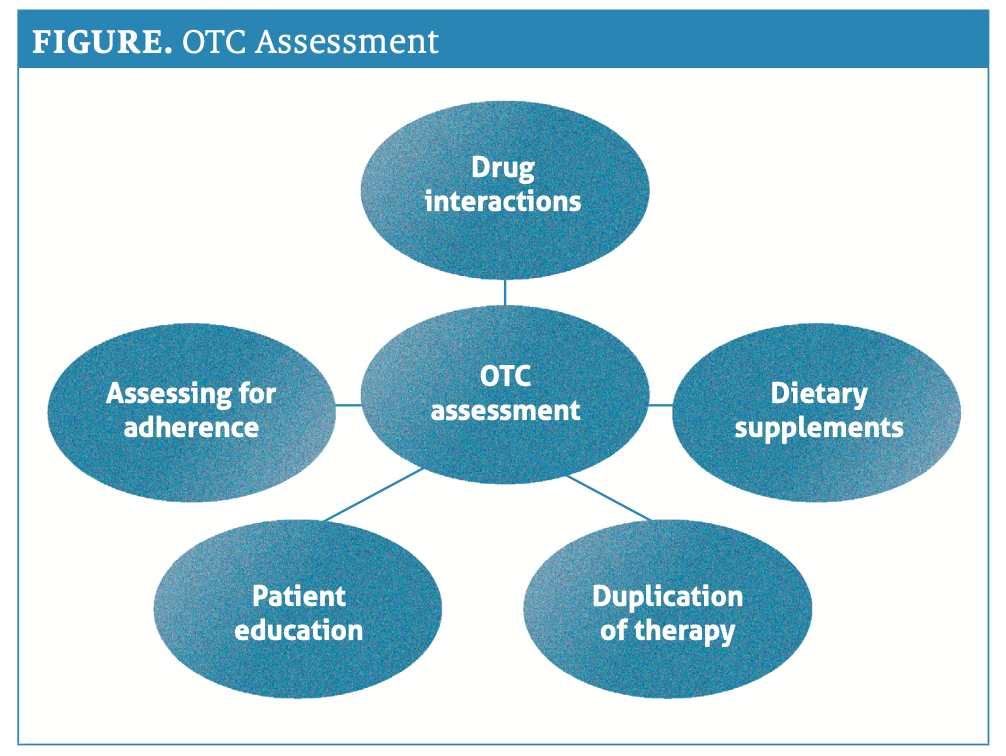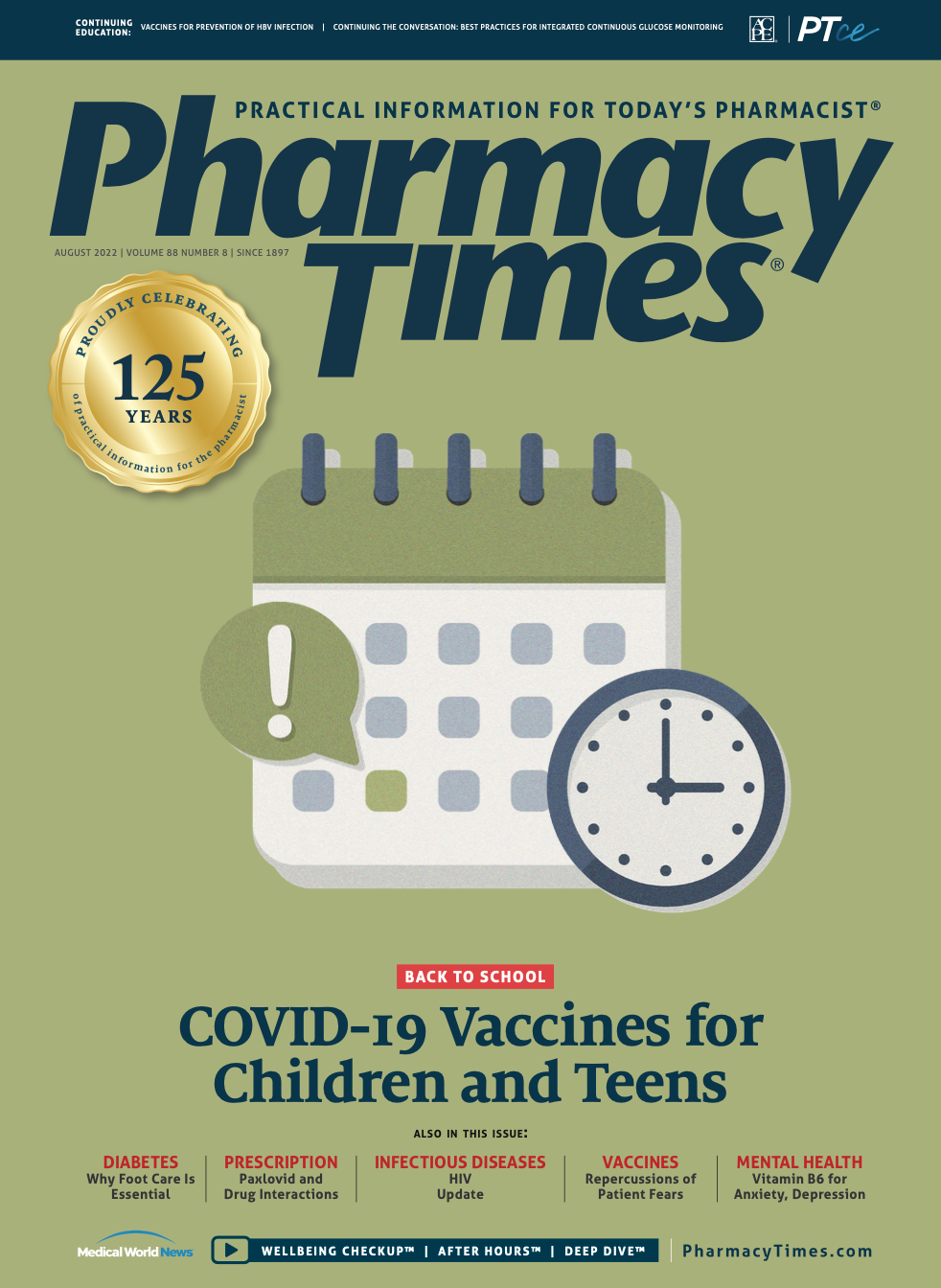Knowing Which OTC Drugs Patients Are Taking Is Vital
Evaluating nonprescription medications, including dietary supplements, can prevent adverse effects.
Approximately 81% of adults in the United States use OTC medications as a first-line treatment for minor symptoms, according to the Consumer Healthcare Products Association.1 Additionally, approximately 93% of adults in the United States prefer treating minor symptoms with OTC medications before consulting health care providers.1
Although OTC products can be helpful for self-care, they also have risks. For instance, there are more than 600 OTC and prescription medications that contain acetaminophen.2 The drug facts label is a valuable tool for checking the active ingredients contained in OTC products to prevent adverse events (AEs), drug interactions, and duplication of therapy. If patients are searching for dietary supplements, pharmacists should also counsel them about looking for the USP Verified Mark, which provides the following information3:
- Active ingredient pharmacokinetics are appropriate.
- Dietary supplement does not contain harmful substances.
- Manufactured using safe, sanitary, well-controlled manufacturing practices.
- Products contain the ingredients listed on the label.
Pharmacists play a key role in assessing patients’ OTC medications during medication therapy management (MTM) consults to prevent medication-related problems (Figure).

Evaluating The Literature
One of the essential components of an MTM consult is reviewing a patient’s OTC medications, including dietary supplements.4 The personal medication record should also include the following OTC medication information: name, dose, indication, schedule, and instructions.4 Pharmacist-led educational interventions are vital in addressing misuse of OTC medications. Acetaminophen and cough products containing dextromethorphan are 2 of the most frequently misused medications, especially among adolescents.5 Pharmacists can educate young individuals and their families at the pharmacy, in school settings, and through community outreach programs about appropriate, safe OTC use.5
Unfortunately, OTC-related AEs involving older adults cause approximately 100,000 hospitalizations in the United States each year.6 Pharmacists can play a key role in educating older adults about OTC products through MTM consults.
One study evaluated how pharmacy staff members engage with patients about OTC medications.7 Nine pharmacists and 8 pharmacy technicians collected data from OTC patient encounters over a 1-week time frame across 4 community pharmacies.7 The OTC collection form noted the estimated patient age, the individual initiating the OTC encounter, problems and symptoms, the staff role during the encounter, staff who assisted, time spent with the patient during the consult, topics discussed, and whether pharmacy staff members left the prescription department.7
There were 111 OTC forms completed during the study period, and adults 65 years and older represented 46% of all encounters.7 The most common encounter was the location of an OTC product.7 Approximately one-third of the encounters involved drug information or a product recommendation.7 Additionally, 41% of OTC encounters involved communication about 2 or more products.7
One study evaluated an innovative redesign of a medication section specifically for older adults, called the Senior Section, to determine its impact on OTC encounters between patients and pharmacy staff members.8 The Senior Section involved a redesign of the physical layout of the OTC aisles in 4 Midwest pharmacies.8 The medications were placed close to the pharmacy prescription department, and signage encouraged older adults to visit the Senior Section and ask the pharmacist medication questions.8 Pharmacy staff members also received training about the Senior Section. Data were evaluated from OTC encounters along with pharmacy and technician interviews.8
The study found that pharmacy staff member participation in OTC product interventions was more likely after the Senior Section was installed.8
About The Author
Jennifer Gershman, PharmD. CPh, PACS, is a drug information pharmacist and Pharmacy Times® contributor who lives in South Florida.
References
1. OTC sale statistics. Consumer Healthcare Products Association. Accessed June 5, 2022. https://www.chpa.org/about-consumer-healthcare/research-data/otc-sales-statistics
2. Common medications containing acetaminophen. KnowYourDose.org. Accessed June 5, 2022. https://www.knowyourdose.org/common-medicines/
3. Quality supplements. United States Pharmacopeial Convention. Accessed June 8, 2022. https://www.quality-supplements.org/
4. Thomas D, Tran J. Medication therapy management. National Board of Medication Therapy Management. September 1, 2020. Accessed June 5, 2022. https://www.nbmtm.org/mtm-reference/medication-therapy-management/
5. Abraham O, Chmielinski J. Adolescents’ misuse of over-the-counter medications:The need for pharmacist-led intervention. Innov Pharm. 2018;9(3):1-7. doi:10.24926/iip.v9i3.979
6. Budnitz DS, Lovegrove MC, Shehab N, Richards CL. Emergency hospitalizations for adverse drug events in older Americans. N Engl J Med. 2011;365(21):2002-12. doi:10.1056/NEJMsa1103053
7. Gilson AM, Stone JA, Reddy A, Chui MA. Exploring how pharmacists engage with patients about over-the-counter medications. J Am Pharm Assoc (2003). 2019;59(6):852-856. doi:10.1016/j.japh.2019.08.001
8. Gilson AM, Xiong KZ, Stone JA, et al. Improving patient-pharmacist encounters with over-the-counter medications: a mixed-methods pilot study. Innov Pharm.2020;11(1):10.24926/iip.v11i1.2295. doi:10.24926/iip.v11i1.2295

